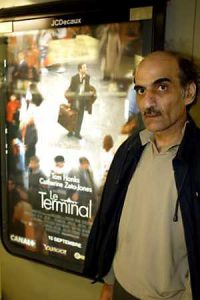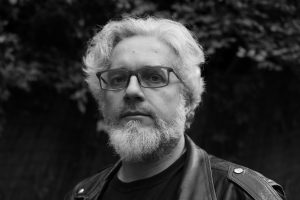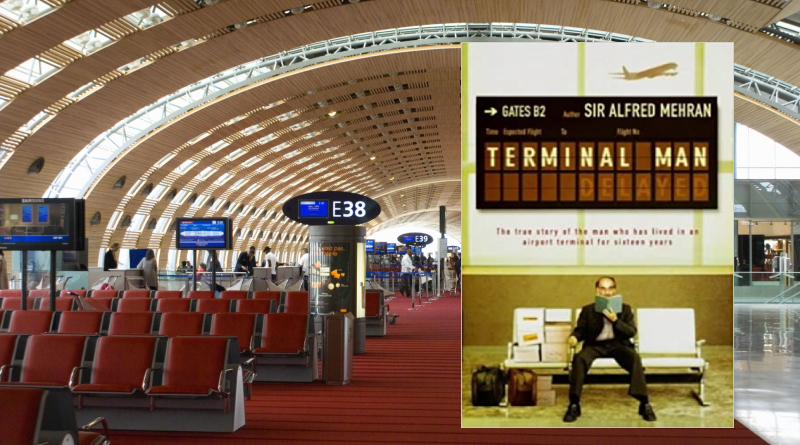The Terminal Man Book by Sir Alfred Mehran & Andrew Donkin
About The Book:
The Terminal Man Was published in 2004, This is the extraordinary story of Mehran Karimi Nasseri, better known as ‘Sir Alfred’ of Charles de Gaulle Airport. Sir Alfred has spent the last 15 years living and sleeping inside the airport’s Terminal One building, trapped in international no man’s land without the proper documentation needed to move on.

Sir Alfred was born in Iran in 1945. When he was twenty his father died and he received an even greater shock when the woman he regarded as his mother told him he wasn’t her son, but the result of a union between his father and a British nurse. A deal was agreed for Sir Alfred to disappear overseas to England and his family would pay for his studies. After a year at university, his family broke all contact and he returned to Iran where he was imprisoned for his political activism, was arrested, and tortured.
He was then expelled from Iran with a passport valid for just one year – so he was now a stateless person. He was mugged on his way to Charles de Gaulle airport in 1988 and lost all his documents. He boarded a plane to London but without the appropriate documentation was sent straight back to Paris.
On trying to leave the airport he was arrested and sentenced as an illegal immigrant and served six months in jail. Upon his release, he returned to Charles de Gaulle and was refused permission to enter any other country. Fearing arrest if he left the terminal building but was unable to board a flight, he was trapped there for years. He sleeps on a red bench borrowed from an old bar, surrounded by piles of newspapers and magazines stored in cargo boxes and his extensive diary. As Sir Alfred remained trapped between countries his fame began to spread.
There have been numerous press and magazines articles around the globe; he receives hundreds of letters from well-wishers as well as his visits and has also featured in three documentary feature films about his plight as the world’s only celebrity homeless person. Political refugee, prisoner, exile, rebel, gentleman, a citizen of the world, media magnet, and, most of all, delayed passenger, The Terminal Man tells Sir Alfred’s incredible and unique life story in his own words.
He adopted the name “Sir, Alfred Mehran”, both the title and its misplaced comma, from a mistake in a letter from British immigration.
Where is Mehran Karimi Nasseri now?
The Red Cross took him under their wing. He eventually accepted French residency, but as plain old Mr Nasseri. As far as Simple Flying can ascertain, Mr Nasseri still lives quietly in France. Jan 20, 2021
Editorial Reviews:
AFTERWORD (by Andrew Donkin)
Sir Alfred is one of a kind and it was a great pleasure and an honour to get to know him well during the writing of the book. I’ve a lovely memory of going to the airport to deliver finished copies of the book to him, only to find that he’d already bought one from the airport bookshop. The joy on his face was a delight to see as he spoke about his happiness as he read the finished book. “A triumph!”
Or even better, if you’ve meet him at his red bench in the airport at any point during his long long stay then please tell us about it.
If you have recent news or recent sightings of Sir Alfred, we’d love to hear about those too. Thank you.
If you have any comments on Sir Alfred’s story please feel free to add them below.
The Terminal Man is also published in Germany, France, Poland, and Japan and several other countries. Special thanks to Barbara Laugwitz.
About The Author:

Andrew Donkin is the author of over sixty books and graphic novels for children and adults. His books have been translated into thirty languages around the world and have sold over eight million copies in the last decade.
Working closely with the New York Times bestselling author, Eoin Colfer, Andrew adapted four Artemis Fowl books into full-length graphic novels for Hyperion. The pair also adapted Eoin’s The Supernaturalist into a graphic novel. Andrew’s original fiction has been published by HarperCollins, Hachette, and Scholastic. His non-fiction books have appeared on the lists of Bloomsbury, DK, and Scholastic.
His work in comics includes Batman: Legends of the Dark Knight for DC Comics, 2000AD, and Doctor Who. He happily believes he is the only writer alive to have written for the characters of Batman, Superman, Doctor Who, and Artemis Fowl.
The Terminal Man, Andrew’s biography of Sir Alfred Mehran, told the moving story of ‘Sir’ Alfred, a homeless refugee who spent 19 years living in Terminal One of Charles du Gaulle Airport in Paris. The Terminal Man was described in The Sunday Times as “a profoundly disturbing and brilliant book.”
His most recent graphic novel is the topical, Illegal, with long-time friends and collaborators Eoin Colfer and Giovanni Rigano.
Illegal was named as Children’s Book of the Week in both The Times and in The Observer. Illegal won the Judges’ Special Prize at Children’s Book Ireland Awards as well as being shortlisted for Children’s Book of the Year at the Irish Book Awards.
SUNDAY TIMES REVIEW:
“A profoundly disturbing and brilliant book”
by Stuart Wavell in the Culture section
Sir Alfred Mehran is sitting on his red bench in the middle of Charles de Gaulle airport, where he has been marooned for 16 years, waiting to leave. Sir Alfred is not his real name, of course: it was something he adopted from a British bureaucrat’s letter which began, “Dear Sir, Alfred”.
He was born Mehman Karimi Nasseria in Iran. But that’s not right, either. He swears he is not Iranian but was born in Sweden, the son of a British nurse. Such is the Kafkaesque world he inhabits, you suspect it might all be true, except the bit about traveling by submarine from Sweden to Iran as a child.
When Sir Alfred discovers his point of origin, perhaps he will depart. He is waiting for a green card so that he can go to America. He is also waiting for a British passport so that he can go to England. One day he will know. Meanwhile, he sits surrounded by his cartons, newspapers, and plastic bags, mindful of the warning that comes at 10-minute intervals: “Passengers are reminded to keep their personal luggage with them at all times.”
His plight inspired Steven Spielberg to build an airport terminal as the set of his movie Terminal, starring Tom Hanks as a Balkan tourist stranded at an American airport when a political coup occurs in his homeland. Sir Alfred was reportedly paid £300,000 for the movie rights, but his needs are modest. Every lunchtime he has a Filet-o-fish from McDonald’s and perhaps an order of French fries.
There is something particularly obscene about Spielberg’s latest appropriation, for this is a profoundly disturbing and brilliant book. The naive simplicity of Sir Alfred’s narrative is reminiscent of Mark Haddon’s bestseller The Curious Incident of the Dog in the Night-time, in which a mildly autistic teenager is incapable of interpreting the perplexing world of adults except in the most literal way.
You wonder if Sir Alfred, too, has a touch of Asperger’s syndrome as he doggedly records events and jokes that he fails to grasp. He focuses obsessively on such minutiae as the Tintin button worn by an interlocutor or the nasal hair of his friend Dr. Bargain, the airport doctor. Yet, as the truth is revealed in fragments and flashbacks, you suspect that, in reality, he is a master of mordant humor.
Here is Groundhog Day writ large, the endless repetition of airport life and bureaucratic Catch-22s. Each day brings a new journalist eager to write his story. This sounds plausible: “I am here because I do not have the correct documentation to leave. I cannot get on a plane because I do not have a passport, and I cannot leave the airport and go into France because I could be arrested by the French police for being an illegal immigrant and put in jail.”
What he omits to mention is that Belgium, and then France, were so embarrassed by all the publicity that they offered him citizenship but he pedantically refused to admit that he was Iranian or sign his name other than as Sir Alfred Mehran. He tells interviewers that his documents were stolen when he was mugged – too ashamed to confess that he posted them to Brussels while aboard a ferry bound for Britain.
Beneath all the onion layers is Sir Alfred’s search for identity. After his father’s death in Iran, his mother informed him that he was not her son, but the offspring of an affair between his father and a British nurse. Denied his inheritance, he was shipped off to university in Britain, where his participation in a demonstration against the Shah lost him his Iranian passport. It was the start of his stateless odyssey.
People write letters of support from all over the world. His lawyer, Dr. Bourguet, works tirelessly on his behalf for 10 years, until his patience comes close to snapping. He tells his client: “In all that time I have not received one single franc. And now we’re here, you have documents in your hands that will allow you to go free. If you sign them, you can go anywhere you want.” No, Sir Alfred tells him.
His friend Dr. Bargain also urges him to sign so that he can go home. “I nod, but really it is Dr. Bargain who does not understand that I am already home.”
This is just an aside but offers the best answer to the mystery of Sir Alfred. He never plans to leave his red bench in Terminal 1 of Charles de Gaulle airport. We trail inside the park, onto a grass field that has been turned into mud by many feet. There is a small stage at the front of the crowd where a politician that many feet. There is a small stage at the front of the crowd where a politician that I do not recognize is speaking through a microphone. I cannot hear what he is saying. My feet hurt and there is water inside my shoes. Still, I would rather have rain than too much heat and dust.
Did You Know: (Book Articles)
2nd March 1974
There are people all around me. The air is warm and full of sweat. I do not like it. I have to be careful not to trip up the man in front of me, or become trampled by the person walking behind me. David Headley has his arm looped in my arm. I do not really like that either, but it is a good protection against falling down. It would not be pleasant to fall down. We come to a straight section of road and the march moves forward in an unsteady surge, as if it were a giant creature that has swallowed me.
I am helpless inside it and can only wait to see what will happen. I think of how I got here. I think of this morning. I woke at 6.00 a.m. and I did not need my alarm clock. Something in my head can tell what time it is when I am sleeping, if I have to get up at a particular moment. Today is not a normal day of attending a lecture, or spending time studying in the library. I enjoy reading magazines and newspapers to improve my English language.
When I awoke today I washed and dressed quickly and went straight to Bradford railway station because that was where we were meeting. When I arrived, I was the only person of my group to be there, but soon other students from the university appeared. Many of them were yawning. They did not put their hand over their mouth when they yawned even when they were speaking to someone. Many people brought banners that they have made. The banners have slogans on them saying bad things about the Shah and expressing their wish that he should leave power soon.
‘Hello Mehran,’ says a voice behind me. I turn and see that it is Martha Johansson. She stretches up on tiptoe and kisses my cheek. She is an American and we are on the same course. She is very intelligent and has no problem with her Yugoslav translation. She does not need to spend as much time in the library as I do. David Headley is the organizer, but he was almost last to arrive. He wears glasses with thick black rims, and has a round face that is always smiling.
He usually wears a blue and white scarf wrapped around his neck. One day last term he got very upset because someone said that he looked like Rupert the Bear. I do not know Rupert the Bear. Martha Johansson told me this was not a good thing not know Rupert the Bear. Martha Johansson told me this was not a good thing to say about David because Rupert the Bear is a character for children.
He lives in a place called Nutwood and his best friend is a badger, which is an underground animal that only exists at night and has a black and white coat. David told everybody to go onto the platform to wait for the train. A few men in suits gave us strange looks and a few smile at the girls. At 7:31 a.m., we caught the 7:23 a.m. train which was running eight minutes late, and we travelled to London. Passengers are reminded to keep their personal baggage with them at all times.
The train terminated its journey at Kings Cross, a great, dirty station that smelled of oil and petrol. At Kings Cross we went down an escalator and caught an underground train to our destination. David checks his watch. ‘Ten to eleven, at least we missed rush hour.’ He is from London. His parents are quite rich, I think, and he supports Chelsea Football Club. When we arrived at Charing Cross on the Northern Line, there was a queue to get out of the station because there were so many people going to the same place.
‘We’ll be all right as long as the rain holds off,’ Dave tells us. When we were finally out of the station and in the open air, the people raised their banners and signs and we joined the protest march against the Shah. The Shah has kept power in Iran by ruling with terror. Many thousands of people were tortured and executed; most of them were political prisoners who disagreed with the Shah. People could not speak or write freely in newspapers; all dissent was suppressed.
In Iran itself, the universities had become the centres of the political opposition to the regime of the Shah. They were joined by student opposition in other countries, organized by the Confederacy of Iranian Students – a group that was formed in Germany. Most Iranian students came from a background of the middle classes or even better-off families, because it cost a lot of money to study abroad and poor families could not afford it.
In the summer of 1967, the Shah made an official visit to Germany because he wanted to promote more business between the two countries. When he arrived, thousands of students came to protest in front of the German opera house in Berlin. One student, Benno Ohnesorg, was killed by a policeman and it became a very famous case. The idea of having protest marches was to draw attention in Britain, Germany, France and America, to events that were occurring in Iran under the Shah.
The Confederacy of Iranian Students wanted to see three things: democracy, social justice and the return of Ayatollah Khomeini who had been exiled by the Shah. I do not think either will be possible while the Shah is living there. How this Shah came to be in power in Iran explains much of the reason why many Iranians resent the West, and America in particular. To understand the origin of this Shah, it is necessary to look back to when the First World War was being fought in Europe, when much of Persia, as the country was known then, was occupied by Britain and Russia.
The British were in the south and the Russians controlled much of the north. The Shah at that time was Shah Ahmad. The British thought that this Shah was growing weak and were worried about what might happen next – both because of the Russian occupation in the north, and also because Germany was occupying neighbouring Iraq. So the British decided to support an army officer called Reza Khan and helped him organize a coup d’état.
Reza Khan set up a puppet prime minister to be in control of the country. A few years later, when things seemed to be going well, he proclaimed himself prime minister instead. He decided that the country needed to be modernized in many ways. There was little transport available in the country, there were hardly any hospitals or doctors, there was little industry except for oil, and few people in the normal population could read and write. He also decided that the country needed a new, modern name and so he changed it from Persia to Iran.
The word Iran came from the word ‘Aryan’, which means ‘from noble birth’. There was much trouble in Iran during the Second World War. The newly named Iran stayed neutral in the war between the Allies and Germany, but Britain and Russia (once more controlling many parts of the country) were worried that Reza Khan might decide to support Germany.
He was forced into exile in South Africa and he died three years later. His 22-year-old son, Mohammed Reza, whose thinking was always very pro- West, took Reza Khan’s place as ruler of Iran. He is the Shah that is still in control today. He nearly lost power in the early Fifties and he had to flee the country, but the American CIA planned a coup to get him back into power because they wanted access to Iran’s oil. They got their way and the Shah returned to rule over Iran and its people.
The Shah instigated some changes that became known as the White Revolution. Some things he did were good, like making sure more people were taught to read and write, and making other things more modern. But many things were not popular with the ulema – the religious powers. One example of something very bad was that the Shah approved a law bill which meant that American soldiers in Iran could not be arrested or prosecuted, no matter what they did.
This particular bill was opposed very strongly by Ayatollah Khomeini, who said in quite a famous quote that the Shah had ‘reduced the Iranian people to a level lower than an American dog’. He said this because if a person ran over a dog in America, that person would be arrested, but if an American ran over an Iranian in Iran, he would go free.
Ayatollah Khomeini was soon exiled by the Shah because of his criticisms. The Shah is now married to his third wife, Farah Diba, the daughter of an army officer. He divorced his first two wives because neither of them gave him a male heir. Only a male heir is eligible to succeed to the throne, so he divorced them in the hope that a third wife will produce one. To keep himself in power, the Shah relied more and more on silencing and killing his opponents. Protests against the Shah and his regime have been growing every year. The Shah makes much money from selling oil to America and the West, but the money does not go to the people because the Shah spends it on building new palaces and on buying weapons from arms merchants.
Most normal people find their conditions getting worse as inflation makes what little money they have worth even less. People are not free to protest in Iran, even at the universities, without the risk of being arrested and put in jail to be tortured or killed. So other people, like student activists, must protest against the Shah’s regimen in countries like England, where it can be done without danger. That is why I am here today, because I do not have to worry about being arrested for marching against such things.
It is now quarter past four in the afternoon. It has been raining since lunchtime. The sky is grey and it is getting darker. We have marched from a long road called The Strand outside Charing Cross station, through Trafalgar Square, along Pall Mall and past Buckingham Palace where the Queen of England lives. Perhaps she was watching from a window, but I do not know. I did not see her. As we go through the gates into Hyde Park, there is a line of press photographers standing on a raised platform, taking photos. ‘Front page,’ says David with a smile. ‘Be everywhere tomorrow.’ He gives me the thumbs up sign, which means that he thinks things are good.
I always write my reviews on Amazon, 3ee, Goodreads, LibraryThing, and Social Media such as Facebook, Instagram, Twitter, Linked In, Telegram.
If you also have read this book, please share your review below, we greatly appreciate your comment, and let’s talk about it!




September 25, 2021
[…] The Terminal Man Book by Sir Alfred Mehran & Andrew Donkin […]